Advertisements
Advertisements
Question
Complete the following sentence by providing a reason:
In Act III, Scene II of the play, The Tempest, Stephano threatens to tie Trinculo to the next tree because ______.
Solution
In Act III, Scene II of the play, The Tempest, Stephano threatens to tie Trinculo to the next tree because he believes that Trinculo is mocking him and is not taking his authority seriously.
APPEARS IN
RELATED QUESTIONS
When you were a young child, did your mother tuck you in, as the poet’s did?
On the basis of your understanding of the poem, answer the following question
by ticking the correct choice.
In the poem 'The Solitary Reaper' to whom does the poet say, ' Stop here or gently
pass'?
Read the following extracts from the story, and try to puzzle out the meanings of the encircled words from other words and phrases in the extract. Write the clues in the empty boxes. Then give your own explanation of the encircled word.
When the liner had finally vanished over the horizon, I was absolutely alone in the stormy night sea. First I thought I had to swim one way, then another. It was not even midnight yet, and I had no hope at all of finding my way in this terrible night time ocean. I began to feel afraid. Waves of fear rolled through me, starting from my hands and feet, attacking my heart and then reaching through my neck to my head. Waves broke over me and water went into my snorkel. I realised I would not be able to last even half an hour in such a condition.
I saw individual stars, but I could not distinguish the constellations they belonged to. Then dawn came and put out all my stars and I felt my solitude more keenly. The sky was grey at first, then blue-violet shades appeared. In a few minutes, the colours became brighter, with dark red strips cutting across the sky!
The rising sun came up over the ocean. I was surrounded by large waves. The clouds turned pink and swept across the sky in all directions. It was a windy day.
There was no land visible. I grew alarmed. Had I made a mistake in my calculations? Perhaps the current had carried me a long a way off the course during the night?
An hour passed, perhaps two. "Landlll" I could not deny myself the pleasure of shouting the magic word aloud and of hearing my own voice. Perhaps it was my ghostly island of Siargao? I almost felt I had succeeded - now at least I had hope.
The sun looked out for the last time, as if it was saying goodbye to me, and hid itself away again. In a few minutes the sky was filled with all the colours of a rainbow, the bright shades changing and merging as I watched. At first the clouds became deep red and then their edges turned bright orange. A little while afterwards, the clouds turned lilac and dark violet. Darkness fell swiftly. My second lonely night in the ocean began. The stars came out unnoticed. I changed course and headed for the south west. As it turned out, this was an unforgivable mistake.
Evening was approaching. The ocean around me was full of life; large fish often leapt out of the water and big birds flew right above my head. I could see the island distinctly now. A line of dancing palms stretched the length of its shore. The sides of the mountain were covered in many different shades of green.
An hour passed, perhaps more. It was extraordinarily quiet. Then suddenly to my horror, I discovered my island had noticeably begun to move north and was drifting further and further in that direction right before my eyes. Before I had worked out what was happening and could sharply change my course towards the north, the southern tip of the island had appeared in front of me and, beyond that, open ocean stretched to the very horizon. I was totally at the mercy of the current and realised to my alarm that it was slowly carrying me past the land.
My third night in the ocean crept up unnoticed. This third night in the ocean was very dark, much darker than the two previous ones. I almost decided to die as I had no hope of seeing another dawn. I was suddenly aware of a quiet voice: "Swim to the sound of the breakers."
Indeed, there had been a distant rumbling for some time, although I had paid no attention to it. Now, I started listening and I thought it sounded like the characteristic noise of jet aeroplanes constantly landing and taking off. The voice inside kept insisting that I should swim towards this thunder of waves.
At last I obeyed. Again I heard an approaching rumble. What I suddenly saw at a distance of about 30 or 40 metres has imprinted itself on my memory forever. It was a gigantic wave with steep, very slowly falling crests. Never in my life had I seen such an enormous wave - it even seemed to be touching the sky. It moved very slowly and was fantastically beautiful.
The wave did not break over me as I assumed it would. An irresistible force dragged me up its steep slope right to the very foot of the falling crest. Instinctively I clutched my mask snorkel and managed to take a deep breath. The crest started to break over me and pulled me under it. For a moment, I found myself in the air
under the crest as ifin a cave. Then my body was in a swirling current of water; the inner power of the wave made me recover several times, twisting me in all directions before it subsided.
I realised that I had to try to keep my body on the crest and I quickly took up a horizontal position. This time the wave quickly grabbed me and carried me at great speed for quite a long distance on its crest.
I got up to the surface easily and swam in the direction the waves were heading. "Somewhere there, beyond the reef, there should be a lagoon," I hoped.
Suddenly, I felt something hard under my feet. I could stand up to my chest in water! Around me I could see random currents of water, splashes of foam and phosphorescent spray, all swirling about. Before I fully came to my senses, another large wave approached and carried me some distance further. I was up to my waist in water when a new wave picked me up, taldng me several metres forward. Now the depth of the water was only up to my knees. I had enough time to take a few tentative steps, to catch my breath and look around.
I surfaced at the foot of very tall palm trees. I left a trail of luminous water and my body glittered like some princess's ball-gown. Only now did I feel completely safe. The ocean was behind me ....
(a) I saw individual stars, but I could not distinguish the constellation they belonged to. Then dawn came and put out all my stars.
Therefore, constellation means ................... 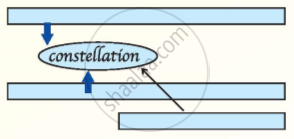
(b) Indeed there had been a distant rumbling for some time, although I had paid no attention to it. Now that I started listening to it I thought it sounded like the characteristic noise of jet airplanes constantly landing and taking off.
Therefore, rumbling means ............
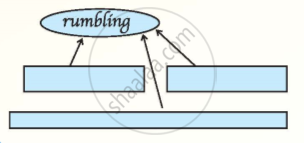
(c) It was a gigantic wave with steep, very slowly falling crests. Never in my life had I seen such an enormous wave. It seemed to be touching the sky.
Therefore, gigantic means ............
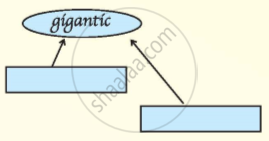
(d) The wave did not break over me as I assumed it would. An irrsistible force dragged me up its steep slope, right to the very foot of the falling crest.
Therefore , irrisistible means.....................

(e) For a moment, I found myself caught in the air under the crest, as if in a cave . Then , my body was in the swirling current of water ; the inner power of the wave made me recover several times , twisting me in all directions before it subsided .
Therefore , swirling means..........
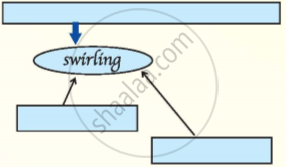
(f) All around me I could see random currents of water splashes of foam and phosphorescent spray of luminous water and my body glittered like some princess's ball gown.
Therefore, phosphorescent means .................
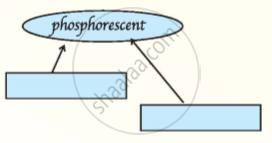
Notice how ideas are connected in the story.
Write what the following words you just used in 1.1 imply by choosing suitable options from the box.
- and:
- but:
- where:
- while:
- after:
- until:
- so :
connects similar actions, objects
denotes contrast
denotes time.
The words given above are called connectors. Connectors do not simply join sentences together; they also show how ideas are related.
There are many different ways of classifying connectors according to their meaning. We shall start with the ones you are already familiar with.
The next man looking 'cross the way
Saw one not of his church
And Couldn't bring himself to give
The fire his stick of birch.
The third one sat in tattered clothes.
He gave his coat a hitch.
Why should his log be put to use
To warm the idle rich?
The rich man just sat back and thought
of the wealth he had in store
And how to keep what he had earned
From the lazy shiftless poor.
Read the lines given above and answer the question that follow.
Why did the rich man refuse to use his stick of wood?
It was a summer evening,
Old Kaspar's work was done,
And he before his cottage door
Was sitting in the sun,
And by him sported on the green
His little grandchild Wilhelmine.
She saw her brother Peterkin
Roll something large and round,
Which he beside the rivulet
In playing there had found;
He came to ask what he had found,
That was so large, and smooth, and round.
Read the lines given above and answer the question that follow.
What was Peterkin doing?
The blocks were all lined up for those who would use them
The hundred-yard dash and the race to be run
These were nine resolved athletes in back of the starting line
Poised for the sound of the gun.
The signal was given, the pistol exploded
And so did the runners all charging ahead
But the smallest among them,he stumbled and staggered
And fell to the asphalt instead.
He gave out a cry in frustration and anguish
His dreams ands his efforts all dashed in the dirt
But as sure I'm standing here telling this story
The same goes for what next occurred.
Read the lines given above and answer the following question:
Who do you think are the competitors? How do you know which is the event mentioned?
We will ponder your proposition and when we decide we will let you know. But should we accept it, I here and now make this condition that we will not be denied the privilege without molestation of visiting at any time the tombs of our ancestors, friends, and children. Every part of this soil is sacred in the estimation of my people. Every hillside, every valley, every plain and grove, has been hallowed by some sad or happy event in days long vanished. Even the rocks, which seem to be dumb and dead as the swelter in the sun along the silent shore, thrill with memories of stirring events connected with the lives of my people, and the very dust upon which you now stand responds more lovingly to their footsteps than yours, because it is rich with the blood of our ancestors, and our bare feet are conscious of the sympathetic touch. Our departed braves, fond mothers, glad, happy hearted maidens, and even the little children who lived here and rejoiced here for a brief season, will love these somber solitudes and at eventide they greet shadowy returning spirits. And when the last Red Man shall have perished, and the memory of my tribe shall have become a myth among the White Men, these shores will swarm with the invisible dead of my tribe^ and when your children’s children think themselves alone in the field, the store, the shop, upon the highway, or in the silence of the pathless woods, they will not be alone. In all the earth there is no place dedicated to solitude. At night when the streets of your cities and villages are silent and you think them deserted, they will throng with the returning hosts’that once filled them and still lover this beautiful land. The White Man will never be alone.
Let him be just and deal kindly with my people, for the dead are not powerless. Dead, did I say? There is no death, only a change of worlds.
Read the extract given below and answer the question that follow.
How is every part of the soil sacred to his people?
She again rubbed a match on the wall, and the light shone round her; in the brightness stood her old grandmother, clear and shining, yet mild and loving in her appearance. “Grandmother,” cried the little one, “O take me with you; I know you will go away when the match burns out; you will vanish like the warm stove, the roast goose, and the large, glorious Christmas-tree.” And she made haste to light the whole bundle of matches, for she wished to keep her grandmother there. And the matches glowed with a light that was brighter than the noon-day, and her grandmother had never appeared so large or so beautiful. She took the little girl in her arms, and they both flew upwards in brightness and joy far above the earth, where there was neither cold nor hunger nor pain, for they were with God.
In the dawn of morning there lay the poor little one, with pale cheeks and smiling mouth, leaning against the wall; she had been frozen to death on the last evening of the year; and the New-year’s sun rose and shone upon a little corpse! The child still sat, in the stiffness of death, holding the matches in her hand, one bundle of which was burnt. “She tried to warm herself,” said some. No one imagined what beautiful things she had seen, nor into what glory she had entered with her grandmother, on New-year’s day.
Read the extract given below and answer the question that follow.
What did the girl say to her grandmother? Why?
Who is Canynge? What scandal is being referred to? Why will it be a scandal?
What reception did Ile get wizen he reached the address that had been advertised? Whom did tit house belong to?
Answer the following question.
What was Soapy’s first plan? Why did it not work?
Find in the poem lines that match the following. Read both one after the other
He is unhappy because there is no sun
Who is Mridu and with whom Mridu went to Rukku Manni’s place?
What distinction Mr Gessler’s shop had?
What was special about the Arabian horse?
Mr Wonka collected whose toe-nail?
How did the bear grow up a vegetarian?
What are the games or human activities which use trees, or in which trees also ‘participate’?
Use the clues given below to complete this crossword puzzle.

Across
1. very tired
2. had an angry look on the face
3. short trousers
4. a fault in a machine that prevents it from working properly
5. a small and naughty boy-fairy
Down
6. work that must be done every day, often boring
7. a basket with a lid
8. gave a short, high-pitched cry
Make noun from the word given below by adding –ness, ity, ty or y
Bitter ___________.
How does the poet describe the facts/journey or antics of a kite in the sky?
Use the phrase in a sentence of your own, after finding out its meaning.
broke apart
What does the author tell about mongooses?
Replace the italicised portion of the sentence below with a suitable phrase from the box. Make necessary changes, wherever required.
He has been told not to take risks while driving a car through a crowded street.
Work in small groups. Ask your partner the questions given below. If possible, ask him/her a reason for saying Yes or No. Then tick Yes/ No, whichever is proper.
1. Do you have a separate room for sleep and study? Yes/No
2. Would you prefer to live in a joint family? Yes/No
3. Do you get on with people? Yes/No
4. Do you like the area you live in? Yes/No
5. Do you find the place overcrowded? Yes/No
6. Do you use public transport? Yes/No
7. Would you like a vehicle of our own? Yes/No
8. Do you like reading? Yes/No
9. Would you like to be a teacher/doctor/engineer/architect? Yes/No
Fill in the blanks with the words given in the box.
| how, what, when, where, which |
You should decide soon ______ to start building your house.
What is ‘strange’ about Mr Nath’s Sundays?
Read the extract given below and answer the questions that follow:
| Shylock: | Shall I not have barely my principal'? |
| Portia: | Thou shalt have nothing but forfeiture. To be so taken at thy peril, Jew. |
- What is the 'principal' that Shylock asks for?
Why does Portia refuse to give it to him? [3] - What is the 'forfeiture' they are referring to?
What danger ('peril') would Shylock be in if he took the forfeiture? [3] - What further hold does the law of Venice have on Shylock? [3]
- What concession does Antonio offer to Shylock?
On what condition does he make this offer? [3] - Why is Shylock in a hurry to leave the courtroom after the trial?
How far can Shylock be blamed for the outcome of the trial?
Give one reason for your response. [4]
Read the following passage carefully and answer the questions that follow:
|
One day I found the pond occupied by several buffaloes. Their keeper, a boy a little older than me, was swimming about in the middle. Instead of climbing out on the bank, he would pull himself up on the back of one of his buffaloes, stretch his naked brown body out on the animal’s glistening hide, and start singing to himself. When he saw me staring at him from across the pond, he smiled, showing gleaming white teeth in a dark face. He invited me to join him in a swim. I told him I couldn’t swim, and he offered to teach me. His name was Ramu, and he promised to give me swimming lessons every afternoon, and so it was during the afternoons — especially summer afternoons when everyone was asleep — that we usually met. Before long I was able to swim across the pond to sit with Ramu astride a contented buffalo. Sometimes I would slip into the water. Emerging in shades of green and khaki, I would sneak into the house through the bathroom and bathe under the tap before getting into my clothes. One afternoon Ramu and I found a small tortoise in the mud, sitting over a hole in which it had laid several eggs. I presented the tortoise to Grandfather. He had a weakness for tortoises, and was pleased with this addition to his menagerie, giving it a large tub of water all to itself, with an island of rocks in the middle. If one of the dogs bothered it too much, it would draw its head and legs into its shell and defy all its attempts at rough play. Ramu came from a family of bonded labourers and had received no schooling. But he was well-versed in folklore and knew a great deal about birds and animals. “Many birds are sacred,” said Ramu, as we watched a blue jay swoop down from a peepul tree and carry off a grasshopper. Both Ramu and Grandfather were of the opinion that we should be more gentle with birds and animals and should not kill so many of them. “It is also important that we respect them, said Grandfather. We must acknowledge their rights. Birds and animals are finding it more difficult to survive, because we are trying to destroy both them and their forests.” Ramu and I spent long summer afternoons at the pond. I still remember him with affection, though we never saw each other again after I left Dehra. |
- For each word given below choose the correct meaning (as used in the passage) from the options provided: [2]
- hide (line 4)
- blanket
- fur
- undisclosed
- skin
- contented (line 12)
- cheerful
- lazy
- satisfied
- container
- hide (line 4)
- Which word in the passage is the opposite of ‘easy’? [1]
- sneak
- difficult
- labourer
- survive
- Answer the following questions briefly in your own words.
- What did Ramu like to do once he had climbed on the back of a buffalo? [2]
- What offer did Ramu make to the narrator? [2]
- Why do you think the narrator would bathe before entering the house? [2]
- Who was the large tub of water for? [1]
- How would the tortoise protect itself from the dogs? [2]
- Despite the lack of schooling what did Ramu know? How, according to Ramu and Grandfather, should we treat birds and animals? Answer in not more than fifty words. [8]
